A commercial boiler is classified as a high-capacity heating system, typically exceeding 200,000 BTUs per hour, designed to provide heat and hot water for large-scale facilities like hotels, hospitals, and manufacturing plants. These boilers come in various types, such as fire-tube, water-tube, and condensing models, each suited for specific applications. Proper installation, regular maintenance, and adherence to regulatory standards are essential for peak performance and safety. Explore further to discover more about their features and operational benefits.
Key insights
- A commercial boiler is defined as having a capacity exceeding 200,000 BTUs per hour, essential for heating and hot water in various industries.
- Common types of commercial boilers include fire-tube, water-tube, and condensing boilers, each suited for specific heating applications.
- Proper boiler sizing is crucial to ensure effective heating without energy waste, considering space size and peak demand.
- Compliance with local codes and safety standards is essential during installation and operation to minimize risks and ensure safety.
- Regular maintenance and inspections are vital for enhancing efficiency, performance, and safety, extending the lifespan of the boiler.
Definition of a Commercial Boiler
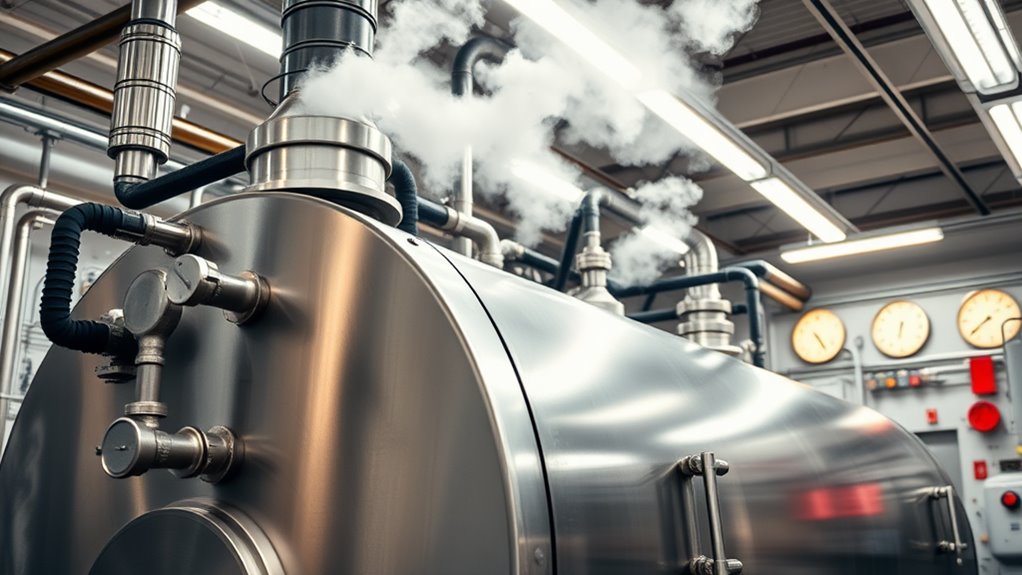
A commercial boiler is an indispensable component in many industries, providing heat and hot water for various applications. You'll find these systems used in hotels, hospitals, and manufacturing facilities, where efficient commercial heating is essential. Typically, commercial boilers are defined as those with a capacity exceeding 200,000 BTUs per hour, though this can vary based on local regulations. Understanding boiler specifications is crucial; it helps you select the right model for your needs. Key specifications often include fuel type, efficiency rating, and pressure levels. By knowing these details, you can guarantee peak performance and compliance with safety standards. Ultimately, investing in the correct commercial boiler boosts efficiency and reduces operational costs in your facility. Additionally, selecting a boiler from high reliability and efficiency can further enhance your energy savings and operational performance.
Key Characteristics of Commercial Boilers
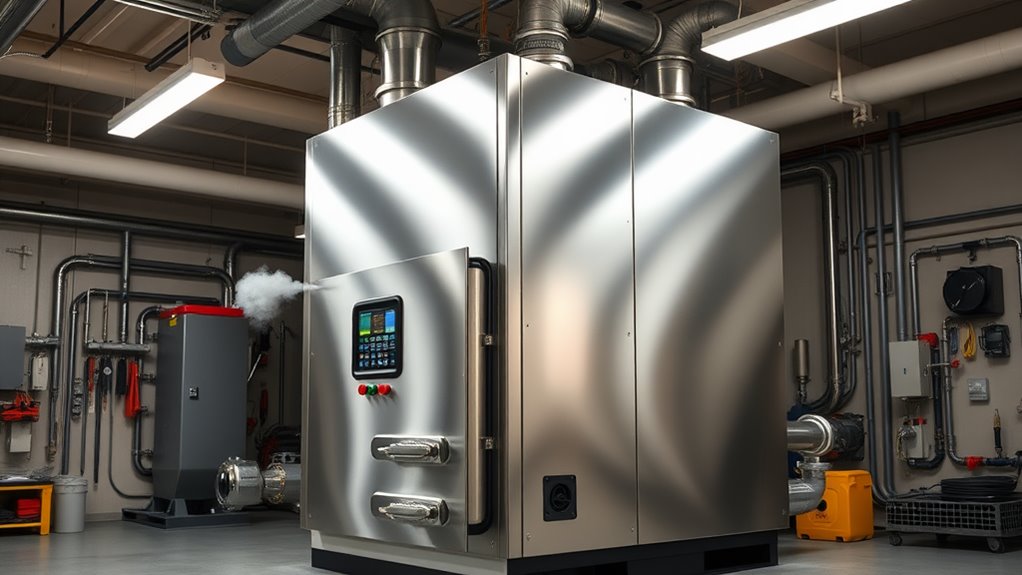
When selecting a commercial boiler, you'll want to pay close attention to its size and capacity, as these factors greatly impact efficiency and performance. Additionally, the variety of fuel type options available can influence operational costs and environmental compliance. Understanding these key characteristics will help you make an informed decision tailored to your facility's needs. Proper heating enhances employee efficiency and morale, ensuring a comfortable working environment that positively affects productivity.
Size and Capacity
Understanding the size and capacity of commercial boilers is essential for ensuring ideal performance and efficiency in your facility. Proper boiler sizing is critical; it determines how effectively your system meets your heating demands without wasting energy. When you conduct a capacity calculation, you consider factors like the square footage of your space, the types of heating needs, and peak demand periods. An oversized boiler can lead to short cycling, while an undersized unit may struggle to maintain desired temperatures. Both scenarios result in inefficiencies and increased operational costs. As a result, accurate boiler sizing and thoughtful capacity calculation are fundamental for optimal performance, longevity, and cost-effectiveness in your commercial heating system. Additionally, regular commercial boiler service ensures that your system operates at peak efficiency, helping to minimize energy consumption and reduce operational costs.
Fuel Type Options
Selecting the right fuel type for your commercial boiler greatly impacts its efficiency, operational cost, and environmental footprint. You should consider various options to find the best fit for your needs. Here are four common fuel types:
- Natural Gas: Widely used for its efficiency and lower emissions compared to other fossil fuels.
- Oil: Provides high energy content but may have higher operational costs and emissions.
- Electricity: Offers convenience and low emissions, especially when sourced from renewable fuels.
- Biomass Options: Utilizes organic materials, promoting sustainability and potentially reducing your carbon footprint. Additionally, considering a commercial heat pump as an alternative can significantly enhance energy efficiency and lower operational costs.
Types of Commercial Boilers
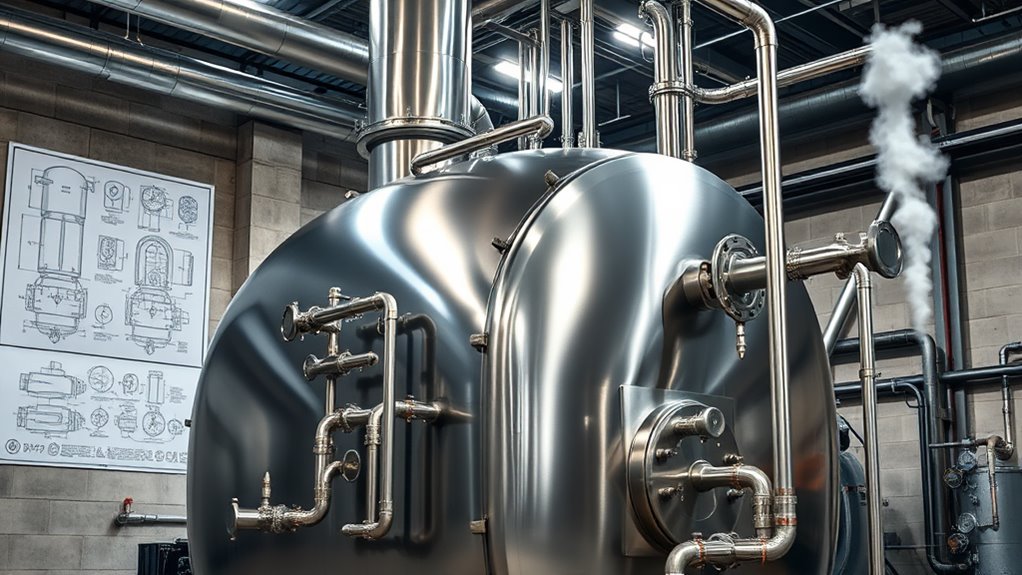
Commercial boilers come in various types, each designed to meet specific heating needs and operational requirements. You'll find that the main boiler types include fire-tube, water-tube, and condensing boilers. Fire-tube boilers utilize hot gases passing through tubes to heat water, while water-tube boilers circulate water within tubes heated by combustion gases. Condensing boilers maximize efficiency by capturing and reusing heat from exhaust gases.
Each of these boiler types employs distinct heating methods, influencing their efficiency and application in commercial settings. For instance, fire-tube boilers are typically suitable for lower pressure applications, whereas water-tube boilers excel in high-pressure scenarios. Understanding these differences helps you select the right boiler for your facility's unique demands. Regular preventative maintenance is essential to ensure that these boilers operate efficiently and safely throughout their lifespan.
Capacity and BTU Ratings
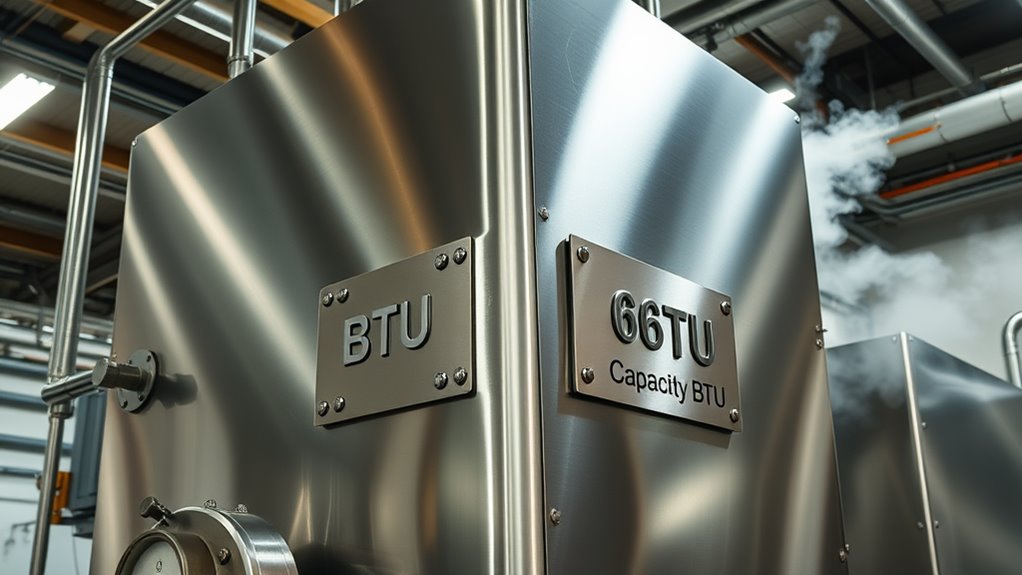
When choosing a boiler type, it's important to evaluate its capacity and BTU ratings, as these factors directly impact heating efficiency and performance. Understanding these metrics helps guarantee you select the right system for your needs. Here are some key capacity considerations and BTU calculations to keep in mind:
- Determine Heating Load: Assess the total heating demand of the space.
- Calculate BTU Requirements: Use the formula: BTUs = heating load x area.
- Consider Seasonal Variations: Factor in temperature fluctuations that may affect performance.
- Evaluate Boiler Efficiency: Look for high-efficiency models to maximize output while minimizing fuel consumption. Additionally, regular maintenance such as commercial power flushing can significantly enhance the system's efficiency and prolong its lifespan.
Fuel Sources for Commercial Boilers
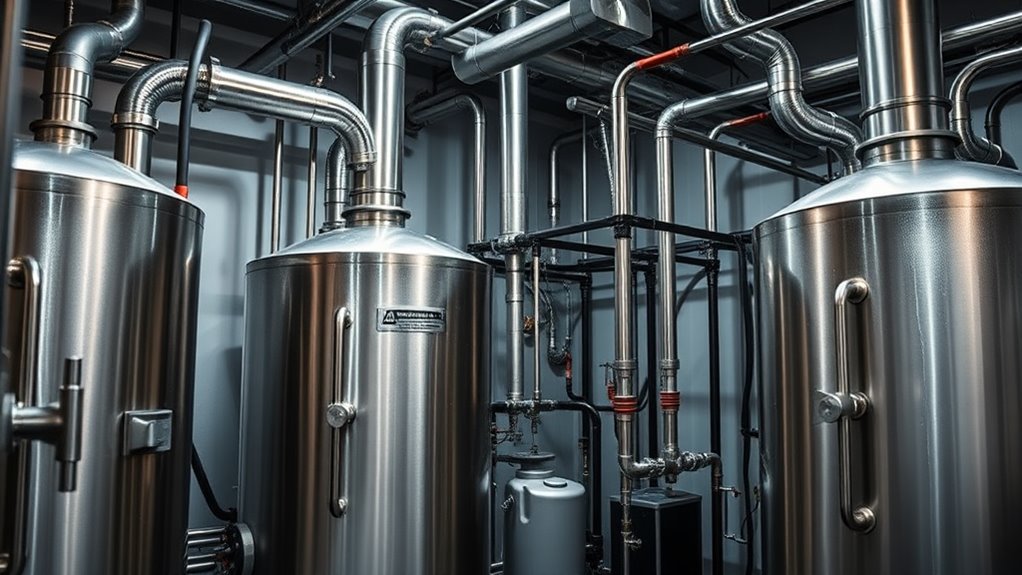
Understanding the various fuel sources available for commercial boilers is essential for optimizing performance and efficiency. Traditional fuels like natural gas and oil are commonly used due to their high energy content and availability. However, you should also consider alternative fuels, such as biodiesel, biomass, and even hydrogen, which can reduce your operation's environmental impact. Each fuel source has unique combustion characteristics that influence efficiency and emissions. For instance, biomass can be a sustainable option but may require specialized handling and storage systems. Evaluating your specific needs and local regulations will guide your choice of fuel, ensuring you select the most efficient and environmentally friendly option for your commercial boiler system. Additionally, ensuring compliance with Commercial Gas Safety Certificates is crucial for maintaining safety and legality in your operations.
Installation Requirements and Considerations
Selecting the right fuel source for your commercial boiler sets the stage for its installation. You'll need to take into account several key factors that can impact both installation challenges and installation costs.
- Space Requirements: Provide sufficient space for the boiler and proper ventilation.
- Local Codes: Familiarize yourself with local regulations to assure compliance.
- Utility Connections: Identify the necessary connections for gas, electricity, or water supply.
- Accessibility: Plan for easy access for future maintenance and repairs. Additionally, regular maintenance helps prevent common error codes and enhances boiler longevity.
Maintenance and Efficiency Standards
Regular maintenance and adherence to efficiency standards are crucial for maximizing the performance of your commercial boiler. Implementing effective maintenance practices, such as routine inspections and cleaning, helps identify potential issues before they escalate. Make sure you check components like burners, heat exchangers, and safety devices regularly to maintain peak functionality.
Additionally, investing in efficiency upgrades can greatly enhance your boiler's performance. Upgrading to high-efficiency burners or incorporating advanced controls can lower operational costs and reduce emissions. Monitoring fuel consumption and emissions regularly will also help you identify areas for improvement. By prioritizing maintenance and efficiency upgrades, you'll not only extend the lifespan of your boiler but also guarantee it operates at peak efficiency, ultimately saving you money in the long run. Regular inspections can detect common error codes, allowing for timely interventions to prevent serious issues.
Regulatory Compliance and Safety Measures
Understanding regulatory compliance and safety measures is essential for operating commercial boilers effectively. You'll need to familiarize yourself with the relevant safety standards and regulatory requirements that govern boiler operations. Regular compliance inspections not only guarantee adherence but also enhance overall safety and efficiency. Additionally, regular maintenance can prevent boiler errors and ensure optimal performance.
Safety Standards Overview
When it comes to commercial boilers, adhering to safety standards is essential for ensuring both operational efficiency and the well-being of personnel. Compliance with safety regulations not only protects workers but also minimizes the risk of costly downtime. To maintain high safety standards, you should focus on the following key measures:
- Regular boiler inspections to identify potential issues before they escalate.
- Implementation of safety protocols for operation and maintenance procedures.
- Training staff on emergency procedures and equipment handling.
- Monitoring emissions to comply with environmental regulations.
Regulatory Requirements Explained
Adhering to safety standards is closely tied to maneuvering the complex landscape of regulatory requirements for commercial boilers. You must familiarize yourself with various regulatory frameworks that dictate design, installation, and operation. These frameworks encompass local, state, and federal regulations, often emphasizing energy efficiency and emissions control. Compliance guidelines are essential in ensuring your boiler meets performance and safety criteria, which can vary based on your specific application. Regular updates to these guidelines necessitate that you stay informed about any changes that could affect your operations. Failure to comply can lead to significant penalties, operational downtime, and safety hazards. Consequently, understanding these requirements is vital for maintaining a safe and efficient environment within your facility.
Compliance Inspections Importance
Compliance inspections play an essential role in guaranteeing that your commercial boiler operates within the established regulatory frameworks. Regular inspections help mitigate risks and maintain safety standards. Here's why they're important:
- Inspection Frequency: Adhering to mandated inspection schedules prevents potential failures and guarantees ongoing compliance.
- Safety Assurance: Inspections identify any safety hazards, protecting both your personnel and property.
- Compliance Documentation: Proper records demonstrate adherence to regulations, which is critical during audits or inspections by authorities.
- Cost Efficiency: Early detection of issues can reduce repair costs and extend the lifespan of your boiler.
Frequently Asked Questions
How Long Does a Commercial Boiler Typically Last?
A commercial boiler typically lasts around 15 to 30 years, depending on factors like usage and maintenance. To maximize your boiler lifespan, guarantee regular maintenance, including annual inspections, cleaning, and timely repairs. Keep an eye on pressure levels and water quality, as these can affect performance. By following these maintenance tips, you'll enhance efficiency and prolong the life of your boiler, ultimately saving you money on replacements and repairs in the long run.
What Are the Common Signs of Boiler Failure?
You should watch for several common signs of boiler failure. If you notice unusual noises, fluctuating temperatures, or leaks, it's time to act. Additionally, if your energy bills spike unexpectedly, that's a red flag. Regular boiler maintenance tips can help you catch issues early, but if you see emergency repair signs like a loss of pressure or strange smells, don't hesitate to call a professional. Keeping your boiler in good shape is essential for safety.
Can Residential Boilers Be Used Commercially?
You can technically use residential boilers in commercial settings, but it's not preferable. Residential applications are designed for smaller spaces and lower demands, which might compromise boiler efficiency in larger environments. In commercial situations, the heating requirements are often higher, and using a residential unit could lead to increased wear and reduced performance. It's essential to evaluate your specific needs and consider commercial-grade boilers for best efficiency and reliability in larger operations.
How Often Should Commercial Boilers Be Serviced?
You should schedule boiler maintenance at least once a year to guarantee peak performance and safety. However, the servicing frequency can vary based on usage and environment. For high-demand systems, consider biannual inspections. Regular servicing not only extends the lifespan of the boiler but also enhances efficiency and reduces the risk of breakdowns. Always consult your manufacturer's guidelines for specific recommendations tailored to your commercial boiler's needs.
What Is the Average Cost of a Commercial Boiler?
The average cost of a commercial boiler can range from $5,000 to $50,000, depending on size, type, and energy efficiency. Installation costs add another $1,000 to $10,000. When you consider energy efficiency, investing in a higher-rated boiler might save you money on utility bills over time. It's crucial to evaluate both upfront and long-term expenses when determining the right boiler for your specific needs. Always factor in potential maintenance costs too.
Summary
In conclusion, understanding what classifies a commercial boiler is vital for selecting the right system for your needs. With various types, capacities, and fuel sources available, you can make informed decisions based on efficiency and regulatory compliance. Regular maintenance and adherence to safety measures will guarantee peak performance and longevity of your boiler. By considering these factors, you'll not only enhance your facility's operational efficiency but also contribute to a safer, more sustainable environment.

